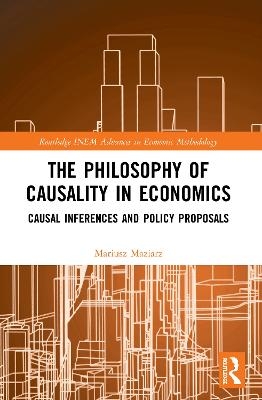
The Philosophy of Causality in Economics
Causal Inferences and Policy Proposals
Seiten
2021
Routledge (Verlag)
978-0-367-49435-3 (ISBN)
Routledge (Verlag)
978-0-367-49435-3 (ISBN)
What do economists mean when they conclude that A ‘causes’ B? Does ‘cause’ say that we can influence B by intervening on A, or is it only a label for the correlation of variables? This book analyses the meaning of causal claims made by economists and the philosophical presuppositions underlying the research methods used.
Approximately one in six top economic research papers draws an explicitly causal conclusion. But what do economists mean when they conclude that A ‘causes’ B? Does ‘cause’ say that we can influence B by intervening on A, or is it only a label for the correlation of variables? Do quantitative analyses of observational data followed by such causal inferences constitute sufficient grounds for guiding economic policymaking?
The Philosophy of Causality in Economics addresses these questions by analyzing the meaning of causal claims made by economists and the philosophical presuppositions underlying the research methods used. The book considers five key causal approaches: the regularity approach, probabilistic theories, counterfactual theories, mechanisms, and interventions and manipulability. Each chapter opens with a summary of literature on the relevant approach and discusses its reception among economists. The text details case studies, and goes on to examine papers which have adopted the approach in order to highlight the methods of causal inference used in contemporary economics. It analyzes the meaning of the causal claim put forward, and finally reconstructs the philosophical presuppositions accepted implicitly by economists. The strengths and limitations of each method of causal inference are also considered in the context of using the results as evidence for policymaking.
This book is essential reading to those interested in literature on the philosophy of economics, as well as the philosophy of causality and economic methodology in general.
Approximately one in six top economic research papers draws an explicitly causal conclusion. But what do economists mean when they conclude that A ‘causes’ B? Does ‘cause’ say that we can influence B by intervening on A, or is it only a label for the correlation of variables? Do quantitative analyses of observational data followed by such causal inferences constitute sufficient grounds for guiding economic policymaking?
The Philosophy of Causality in Economics addresses these questions by analyzing the meaning of causal claims made by economists and the philosophical presuppositions underlying the research methods used. The book considers five key causal approaches: the regularity approach, probabilistic theories, counterfactual theories, mechanisms, and interventions and manipulability. Each chapter opens with a summary of literature on the relevant approach and discusses its reception among economists. The text details case studies, and goes on to examine papers which have adopted the approach in order to highlight the methods of causal inference used in contemporary economics. It analyzes the meaning of the causal claim put forward, and finally reconstructs the philosophical presuppositions accepted implicitly by economists. The strengths and limitations of each method of causal inference are also considered in the context of using the results as evidence for policymaking.
This book is essential reading to those interested in literature on the philosophy of economics, as well as the philosophy of causality and economic methodology in general.
Mariusz Maziarz is a PhD candidate at Wroclaw University of Economics, Poland, and Assistant Researcher with the Interdisciplinary Centre for Ethics & Institute of Philosophy at Jagiellonian University, Poland.
(1) Introduction (2) Regularities (3) Causality as changes in conditional probability (4) Counterfactuals (5) Mechanisms (6) Interventions and manipulability (7) Concluding remarks
| Erscheinungsdatum | 14.12.2021 |
|---|---|
| Reihe/Serie | Routledge INEM Advances in Economic Methodology |
| Zusatzinfo | 7 Line drawings, black and white; 7 Illustrations, black and white |
| Verlagsort | London |
| Sprache | englisch |
| Maße | 156 x 234 mm |
| Gewicht | 322 g |
| Themenwelt | Geisteswissenschaften ► Philosophie |
| Wirtschaft ► Allgemeines / Lexika | |
| Wirtschaft ► Volkswirtschaftslehre | |
| ISBN-10 | 0-367-49435-3 / 0367494353 |
| ISBN-13 | 978-0-367-49435-3 / 9780367494353 |
| Zustand | Neuware |
| Informationen gemäß Produktsicherheitsverordnung (GPSR) | |
| Haben Sie eine Frage zum Produkt? |
Mehr entdecken
aus dem Bereich
aus dem Bereich
wie Philosophie uns helfen kann, unseren Weg zu finden
Buch | Hardcover (2023)
dtv Verlagsgesellschaft
26,00 €
mit Kant zur medialen Mündigkeit
Buch | Softcover (2024)
Verlag Herder
20,00 €


